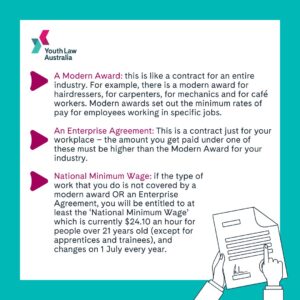For free and confidential legal advice about this topic, please contact us here.
As an employee, you should be paid for all hours that you work. How much you get paid will be set out in your employment contract, an enterprise agreement or a modern award and it might be different depending on your age or whether you are a casual or permanent employee. If you have been underpaid, there are steps that you can take.
Navigate this page
Minimum wage
All employees in Australia must be paid at least the National Minimum Wage, which is different for every type of job and industry (and changes on 1 July every year). While your boss can pay you more than the minimum wage, they can’t pay you less. Importantly, the minimum wage for every type of job in Australia must be at least $24.10 an hour for people over 21 (except for apprentices and trainees). So, if you’re getting less than that, you’re being underpaid.
See below for more information on what YOU should be getting.
How do I know if I'm being paid the right amount?
Depending on the type of work you do, your pay will be decided by one of the following:

Does my pay change depending on how old I am?
Yes. Many awards and agreements include junior rates of pay (for workers under 21). Junior rates are usually a percentage of an adult rate for a job.
| EXAMPLE: Cady is 17 years old and works casually in a cafe. Her modern award is called the ‘Restaurant Award’, which says that she must be paid at least $18.08 an hour. Someone 20 years or over doing the same job as her would be paid at least $30.13. |
How can I figure out how much I should be paid?
Once you know whether your employment is covered by and award or enterprise agreement you can calculate your pay using the Fair Work Ombudsman’s Pay and Conditions Tool (PACT).
If you need help calculating how much you should be paid, you can contact us here.
Are there other things I should be paid for, like working weekends?
A lot of jobs must be paid things called ‘penalty rates’, which is more money for working at certain times or on certain days, like working Sundays or late at night. Use the Fair Work Ombudsman’s Pay and Conditions Tool (PACT) to find out what penalty rates you should get for your job.
Do I get paid for public holidays even if I am not working?
Full time employees are paid for public holidays even if they do not work on that day.
Part time employees will only be paid if they would normally work on the day that falls on a public holiday.
Casual employees will not generally be entitled to payment for a public holiday if they do not work that day. If they do work on a public holiday, casual employees will ordinarily be entitled to receive penalty rates.
For more information about working on public holidays, check out this video, and you can read more about public holidays here.
What if I think I have been underpaid?
Sometimes underpayments are because of a misunderstanding. Often though, it’s a case of wage theft by an employer, which is illegal. If you do think you’ve been underpaid:
- Check how much you should have been paid, using the Fair Work Ombudsman’s Pay and Conditions Tool. This tool will help you figure out how much you should be paid, including for things like weekend work and overtime.
- Speak to your employer, your supervisor, your manager or HR manager about it, if you feel comfortable to do so. Have the details from the PACT tool ready to show them. Speaking directly with your employer will help you to figure out if there has been a misunderstanding, or if it’s a case of wage theft. You can practice having a difficult conversation in the Fair Work Ombudsman’s Difficult conversation in the workplace course here. If you don’t feel comfortable speaking directly with them, you can write a letter or email to them, stating the rates that you are entitled to under the award.
- Record your hours, using the ‘Record my hours’ app from the Fair Work Ombudsman. This is especially important if your employer doesn’t keep proper records of all your hours, which may be causing some of the underpayments.
It is important to know that your employer cannot take adverse action against you, which could mean things like firing you or demoting you, for making an enquiry about your pay.
If talking to your employer does not solve the issue, there are further steps you can take, including:
- Getting help from your union if you are a union member;
- Writing a letter of demand;
- Making a complaint to the Fair Work Ombudsman who may be able to investigate and take enforcement action, or
- Taking legal action in court to recover unpaid wages.
Generally, you have 6 years to make a complaint about underpayments at work.
If you think that you may have been underpaid, we strongly encourage you to contact us here for free and confidential legal advice about next steps that you can take.
More information about pay
The following pages on specific pay issues may also be useful:
Share this article
Date Published
October 23, 2018Last Updated
July 31, 2024Got a question you can't get answered?
If you have a problem or a question, you can send it to us today and we can provide you with free advice, information and referrals to help solve your problem. Just click on the button below.
Get help now